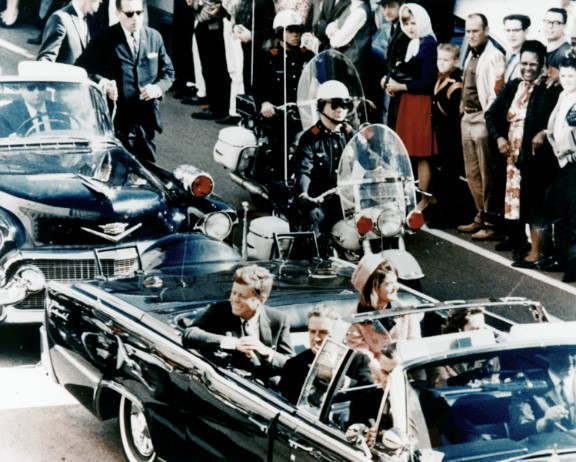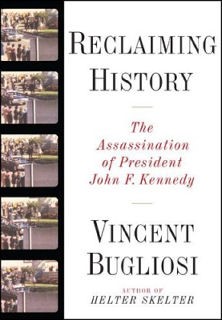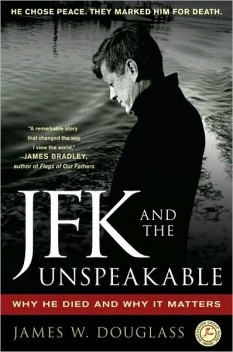 Fifty years ago today, at 12:30 p.m., President John F. Kennedy was shot and killed in Dallas, Texas. Two days later the chief suspect in his death, Lee Harvey Oswald, was himself shot and killed by Dallas nightclub owner Jack Ruby. Confusion, suspicions, and accusations followed immediately and have continued to this day. Every attempt to establish the facts only seems to create more controversy.
Fifty years ago today, at 12:30 p.m., President John F. Kennedy was shot and killed in Dallas, Texas. Two days later the chief suspect in his death, Lee Harvey Oswald, was himself shot and killed by Dallas nightclub owner Jack Ruby. Confusion, suspicions, and accusations followed immediately and have continued to this day. Every attempt to establish the facts only seems to create more controversy.
Several federal government investigations have been conducted and reports issued over the years, beginning with the Warren Commission, established a week after the assassination, and there have also been countless investigations, books, and articles from private citizens. Anyone attempting to learn about the Kennedy assassination has an overwhelming amount of material to slog through, and yet there are also numerous gaps in the record, missing pieces of the puzzle that only add to one’s sense of frustration.
Here are a few resources that provide convenient points to begin researching this complex and controversial subject:
JFK Assassination Records Collection (NARA)
http://www.archives.gov/research/jfk/
Shortly after Oliver Stone released his 1991 movie JFK, which mentioned briefly that thousands of government files related to the Kennedy assassination were still classified, there was a public demand for the government to release the files. Shortly thereafter Congress passed the John F. Kennedy Assassination Records Collection Act of 1992, which mandated that all government records related to the Kennedy assassination be gathered into a single collection in the National Archives and Records Administration (NARA) and required that all records be available to the public no later than October 26, 2017, with the exception of those the president decides must be kept secret for national security reasons.
The act also established the Assassination Records Review Board (ARRB), an independent agency that was responsible for reviewing and rendering a decision on files that an agency considered too sensitive to be released yet. The ARRB also collected testimony of people who had information connected with the assassination and added that testimony to the collection.
The JFK Assasination Records Collection Web site provides a number of methods for searching this enormous collection, but only a few of the materials are available online. There is also an FAQ that answers some of the most frequently asked questions about the collection, such as “How can I get a copy of the Warren Commission Report?” and “Can I view Mrs. Kennedy’s pink suit?”
The JFK Assassination (Mary Ferrell Foundation)
http://www.maryferrell.org/wiki/index.php/JFK_Assassination
Mary Ferrell, a historical researcher who was working in downtown Dallas at the time of the assassination, almost immediately took it upon herself to begin collecting what eventually grew into an enormous—and enormously valuable—collection of books, newspapers, magazines, reports, and declassified documents. The Mary Ferrell Foundation has put many of these documents online, and their Web site also has a number of helpful articles summarizing various aspects of the event and the many investigations that have been taking place over the years. There are links to a plethora of related resources.
JFK Facts
This site includes the latest news about the assassination and about progress being made toward the release of classified government files, especially from the CIA. It includes educational materials such as Tips for Writing a JFK Term Paper and questions raised about the assassination. The site’s moderator, Jefferson Morley, is a widely-published journalist and is currently suing the CIA for release of classified documents.
Press Kit: November 22, 1963 (JFK Presidential Library)
http://www.jfklibrary.org/About-Us/News-and-Press/Press-Kit-November-22-1963.aspx
The John F. Kennedy Presidential Library and Museum has made available on their Web site a smattering of photographs, moving images, and audio files that were recorded from November 22 to 25, 1963. They have also provided a selection of primary source documents and oral histories from participants in the events of those days. All these materials are in the public domain and are media ready. This source is useful not just for reporters, but for anyone wishing to get a sense of what it was like to be around at that time.
Related Reading
There have been countless books written about the Kennedy assassination, some well worth reading, others less so. Here are two recent works of scholarship that present exhaustive arguments for or against conspiracy, each supporting their arguments by the mountain of evidence that has accumulated over the years.
Reclaiming History: The Assassination of President John F. Kennedy, by Vincent Bugliosi. New York: W.W. Norton & Co. (2007).
 This book is largely based on evidence gathered while the author, who once successfully prosecuted Charles Manson, prepared for a mock trial in which he prosecuted Lee Harvey Oswald on British television and obtained a verdict of guilty. The author examines the events of the assassination in great detail and draws the same conclusion as the Warren Report—Oswald shot Kennedy and was acting alone. The author also discusses the trial of Jack Ruby and reviews and attempts to debunk several of the major conspiracy theories that have been proposed over the years.
This book is largely based on evidence gathered while the author, who once successfully prosecuted Charles Manson, prepared for a mock trial in which he prosecuted Lee Harvey Oswald on British television and obtained a verdict of guilty. The author examines the events of the assassination in great detail and draws the same conclusion as the Warren Report—Oswald shot Kennedy and was acting alone. The author also discusses the trial of Jack Ruby and reviews and attempts to debunk several of the major conspiracy theories that have been proposed over the years.
JFK and the Unspeakable: Why He Died and Why It Matters, by James W. Douglas. Maryknoll, N.Y.: Orbis Books (2008).
 This book, highly praised by Oliver Stone, argues that Kennedy, who went through a conversion from a traditional “Cold Warrior” being urged toward violence by his military and intelligence advisors to a leader who sought peaceful solutions to international conflict arrived at through private negotiations with “the enemy,” was perceived as a threat to the burgeoning military-industrial-intelligence establishment seeking to control the government and was therefore eliminated as the result of a plot orchestrated by the CIA. The reason “why it matters,” the author argues, is that ever since this incident the national security state, operating in secrecy and with impunity, has only grown more powerful, more secretive, more expensive, and more violent.
This book, highly praised by Oliver Stone, argues that Kennedy, who went through a conversion from a traditional “Cold Warrior” being urged toward violence by his military and intelligence advisors to a leader who sought peaceful solutions to international conflict arrived at through private negotiations with “the enemy,” was perceived as a threat to the burgeoning military-industrial-intelligence establishment seeking to control the government and was therefore eliminated as the result of a plot orchestrated by the CIA. The reason “why it matters,” the author argues, is that ever since this incident the national security state, operating in secrecy and with impunity, has only grown more powerful, more secretive, more expensive, and more violent.
What is your opinion on the causes and consequences of the Kennedy assassination?


